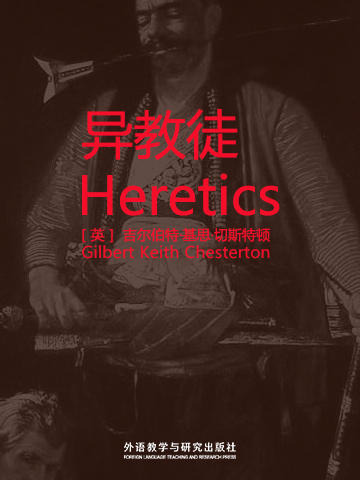在一个人们逐渐迷失自我的社会,人们的生活和精神如何才能转入正轨?
Heretics is a series of essays by Gilbert Keith Chesterton. First published in 1905. It is a book about religion and politics, theory and fact, morals and efficiency.
在《异教徒》一书中,作者反对在他看来与社会相违背的现象。他指出社会已经逐渐远离正轨,人们开始迷失自我,并且探讨了如何将生活和人们的精神转入正轨。在作者看来,为自己的观点和他人不同而战是愚蠢的,但是否认哲学的力量更是愚蠢至极。
In Heretics, Gilbert K. Chesterton rails against what he sees as wrong with society. He points out how society has gone astray and how life and spiritually could be brought back into focus. It is foolish to fight for people's disagreement in their theory of the universe, but it is even more to think that one's philosophy does not matter.
- I. Introductory Remarks on the Importance of Orthodoxy
- II. On the negative spirit
- III. On Mr. Rudyard Kipling and Making the World Small
- IV. Mr. Bernard Shaw
- V. Mr. H. G. Wells and the Giants
- VI. Christmas and the Aesthetes
- VII. Omar and the Sacred Vine
- VIII. The Mildness of the Yellow Press
- IX. The Moods of Mr. George Moore
- X. On Sandals and Simplicity
- XI Science and the Savages
- XII Paganism and Mr. Lowes Dickinson
- XIII. Celts and Celtophiles
- XIV On Certain Modern Writers and the Institution of the Family
- XV On Smart Novelists and the Smart Set
- XVI On Mr. McCabe and a Divine Frivolity
- XVII On the Wit of Whistler
- XVIII The Fallacy of the Young Nation
- XIX Slum Novelists and the Slums
- XX. Concluding Remarks on the Importance of Orthodoxy
- 书评 写书评
- 笔记
-
书评加载中...























 京公网安备 11010802032529号
京公网安备 11010802032529号
笔记加载中...